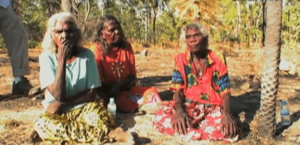Marringarr language facts for kids
Quick facts for kids Marri Ngarr |
|
|---|---|
| Matige | |
| Native to | Australia |
| Region | Daly River |
| Ethnicity | Marringarr, Mati Ke |
| Native speakers | 8 Marri Ngarr (2006 census)aiatsis 2 Magati Ke (2009) |
| Language family |
Western Daly
|
| Dialects |
Marri Ngarr
Marti Ke (Magati-ge)
|
| AIATSIS | N102 Marri Ngarr, N163 |
The Maringarr language (also known as Marri Ngarr) is an Aboriginal language spoken in the Northern Territory of Australia. It is considered a very old language.
Marti Ke (also called Magati Ke or Matige) is a language closely related to Marri Ngarr. It was spoken by the Mati Ke people. As of As of 2020[update], efforts are being made to help save this language from disappearing.
Contents
Where These Languages Are Spoken
These languages have been spoken in the Northern Territory of Australia. You would find them near Wadeye. This area is along the Timor Sea coast. It stretches south from the Moyle River estuary to Port Keats. This is southwest of Darwin.
Why These Languages Are Endangered
Sadly, the Mati Ke language is very close to disappearing. In 2005, only three people were known to speak it. These were Patrick Nudjulu, Johnny Chula, and Agatha Perdjert.
Most Mati Ke speakers have started using English instead. They also use Murrinh-Patha, which is another strong Aboriginal language. About 100 people are part of the Mati Ke ethnic group. Around 50 people use it as a second language.
Because the language is almost gone, experts called linguists are working hard. They are collecting information and recording the voices of the few remaining speakers. This helps to save what they can.
Helping Languages Survive
As of As of 2020[update], Mati Ke is one of 20 languages chosen for a special project. This project is called the Priority Languages Support Project. It is run by First Languages Australia. The goal is to find and record languages that are in great danger. These are languages with little or no information written down. They might not have any recordings, but they still have living speakers.
How the Language Works
The Marri Ngarr language has a limited number of words. This means that the order and position of words are very important. They help to make sense of what is being said. It is a polysynthetic language. This means words can have many parts joined together. These parts can act like whole sentences.
Marringarr also uses something called ergativity. This is a special way of showing who is doing an action. It uses a small word part called -ŋarrin.
Noun Classes: Grouping Words
A very important part of the language is how it groups nouns. Nouns are words for people, places, or things. This system helps speakers understand the world. Marri Ngarr has 10 different noun classes.
These classes include:
- Trees, wooden items, and long, stiff objects
- Things made by people and natural objects
- Vegetables
- Weapons and lightning
- Places and times
- Animals
- Higher beings like spirits and people
- Speech and languages
Here are some examples of noun classes:
| Noun Class | Classifier |
|---|---|
| Trees, wooden items, and long, stiff objects | thawurr |
| Higher beings | me |
| Animals | a |
| Manufactured and natural objects | nhannjdji |
| Vegetables | mi |
Words You Can Learn
Here are a few words from the Maringarr language:
| Maringarr | English |
|---|---|
| mi bakulin | billygoat plum |
| nhanjdiji marri | cycad |
| a marri | bush cockroach |
| a wayelh | Goanna lizard |
| a dhan gi | saltwater prawn |
 | Aurelia Browder |
 | Nannie Helen Burroughs |
 | Michelle Alexander |


